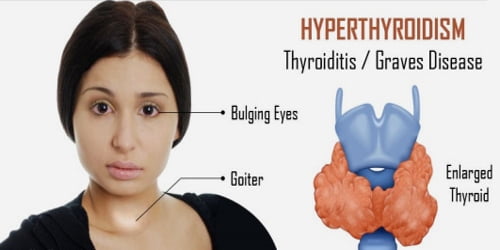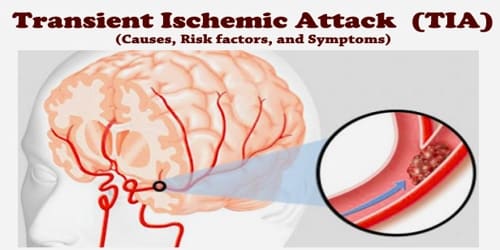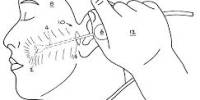Hyperthyroidism (Symptoms, Diagnosis, and treatment)
Definition: Hyperthyroidism (or Overactive Thyroid) happens when the thyroid gland produces too much thyroid hormone. This has an impact throughout the body. The thyroid is a small, butterfly-shaped gland located at the front of our neck. It produces tetraiodothyronine (T4) and triiodothyronine (T3), which are two primary hormones that control how our cells use energy.
Hyperthyroidism occurs when the thyroid makes too much T4, T3, or both. Hyperthyroidism is distinct from hypothyroidism. “Hyper” refers to the presence of too much thyroid hormone in the system. “Hypo” means too little, or an underactive thyroid.
Hyperthyroidism can be caused by a number of conditions, including Graves’ disease, Plummer’s disease, and thyroiditis. Other causes include multinodular goiter, toxic adenoma, inflammation of the thyroid, eating too much iodine, and too much synthetic thyroid hormone. A less common cause is a pituitary adenoma.
Signs and symptoms vary between people and may include irritability, muscle weakness, sleeping problems, a fast heartbeat, heat intolerance, diarrhea, enlargement of the thyroid, hand tremor, and weight loss. Symptoms are typically less in the old and during pregnancy.
Several treatments are available for hyperthyroidism. Doctors use anti-thyroid medications and radioactive iodine to slow the production of thyroid hormones. Sometimes, hyperthyroidism treatment involves surgery to remove all or part of our thyroid gland.
Although hyperthyroidism can be serious if people ignore it, most people respond well once hyperthyroidism is diagnosed and treated.
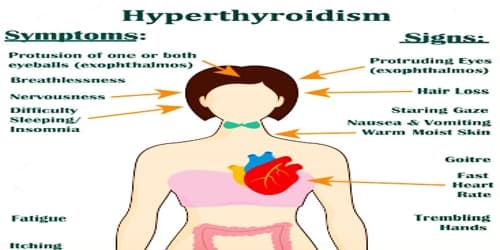
Signs and Symptoms of Hyperthyroidism: Hyperthyroidism may be asymptomatic or present with significant symptoms. Patients with mild hyperthyroidism are often unaware that they have it because there are no symptoms.
Most symptoms are related to the increase in metabolic rate. They include:
- swelling in the neck caused by an enlarged thyroid gland, or goiter
- nervousness, irritability, mood swings, and decreased concentration
- diarrhea
- difficulty breathing
- fatigue, tiredness, and difficulty sleeping
- muscle weakness
- hyperactivity
- oversensitivity to heat, excessive sweating, and warm, damp skin
- increased appetite
- increased bowel movements and urination
- infertility and a loss of interest in sex
- itchy skin with raised itchy swellings (urticaria)
- nails become loose
- menstrual problems in women, especially lighter periods or absence of periods
- alopecia where hair is lost in patches
- accelerated heartbeat, sometimes with palpitations
- redness on the palms of hands
- sudden weight loss or gain
- trembling hands and shakiness
Hyperthyroidism can also cause atrial fibrillation, a dangerous arrhythmia that can lead to strokes, as well as congestive heart failure.
Sometimes an uncommon problem called Graves’ ophthalmopathy may affect a patient’s eyes, especially if they smoke. This disorder makes their eyeballs protrude beyond their normal protective orbits when the tissues and muscles behind their eyes swell. Eye problems often improve without treatment.
Signs and symptoms of Graves’ ophthalmopathy include:
- Dry eyes
- Red or swollen eyes
- Excessive tearing or discomfort in one or both eyes
- Light sensitivity, blurry or double vision, inflammation, or reduced eye movement
- Protruding eyeballs
Older adults are more likely to have either no signs or symptoms or subtle ones, such as an increased heart rate, heat intolerance and a tendency to become tired during ordinary activities.
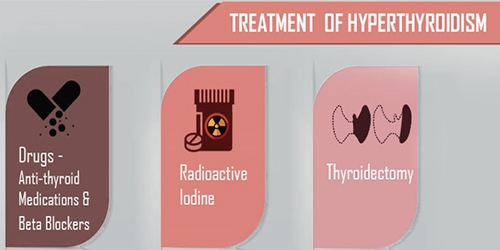
Diagnosis and Treatment of Hyperthyroidism: The diagnosis may be suspected based on signs and symptoms and then confirmed with blood tests. Typically blood tests show a low thyroid stimulating hormone (TSH) and raised T3 or T4. Radioiodine uptake by the thyroid, thyroid scan, and TSI antibodies may help determine the cause.
Ultrasounds can measure the size of the entire thyroid gland, as well as any masses within it. Doctors can also use ultrasounds to determine if a mass is solid or cystic. A CT or MRI can show if a pituitary tumor is present that’s causing the condition.
A woman with hypothyroidism may find it harder to become pregnant. Some women who are susceptible but have not been diagnosed before may have a slightly hyperactive thyroid during pregnancy. Severe, untreated hyperthyroidism during pregnancy has been linked to spontaneous abortion, low birth weight, maternal high blood pressure, and heart problems.
Several treatments for hyperthyroidism exist. The best approach for the patient depends on their age, physical condition, and the underlying cause of the hyperthyroidism, personal preference and the severity of their disorder. Possible treatments include:
- Medication – Antithyroid medications, such as methimazole (Tapazole), stop the thyroid from making hormones. They are a common treatment.
- Radioactive iodine – Radioactive iodine is picked up by the active cells in the thyroid, and it destroys them. The destruction is local, and there are no widespread side effects. The dose of radioactivity contained in the radioiodine is very low and is not harmful.
- Beta-blockers – Although these drugs are usually used to treat high blood pressure and don’t affect thyroid levels, they can ease symptoms of hyperthyroidism, such as a tremor, rapid heart rate, and palpitations. These medications generally aren’t recommended for people who have asthma, and side effects may include fatigue and sexual dysfunction.
- Surgery – Surgery can remove part of the thyroid gland if other treatments are not possible, for instance, during pregnancy, cannot tolerate other therapies, or has cancer.
Patients may find it useful to avoid food and other products that are high in iodine, such as seaweed and some cough medicines and multivitamins.
Hyperthyroidism can also cause our bones to become weak and thin, which can lead to osteoporosis. Taking vitamin D and calcium supplements during and after treatment can help strengthen our bones.
Information Source:
